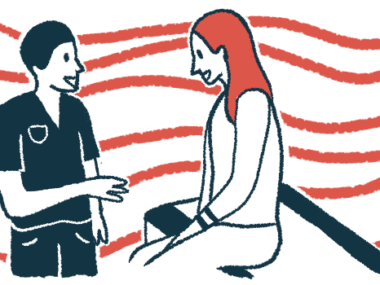By listening to my body, I know when to schedule a checkup
Part of understanding the PNH journey is paying attention to symptoms
Written by |

After being diagnosed with paroxysmal nocturnal hemoglobinuria and aplastic anemia, I’ve learned to listen to my body and identify specific symptoms when they occur. I experience an array of them, including nosebleeds, fatigue, blood in the urine, and headaches. By recognizing them, I can determine which ones target my body more intensely.
Specifically, bruising and headaches are intense symptoms I look for and act upon. At least once a week, I’ll scan my body and look for any signs of bruising. I’ll search my legs, arms, back, and stomach. If I find a bruise, I’ll think about how I got it. Did I bump into something while walking or running? Did I cause it, or did it show up on its own?
If I can’t come up with an answer, I’ll either write it down or add a note on my phone to remind myself of the bruise.
After scanning my body, I’ll count how many bruises I have at a given time. Weirdly, I’ll also date them and keep an eye on how quickly they fade away.
Here’s a tip: Knowing your body and understanding what works for you is crucial on your health journey.
If a bruise remains too long without healing or hasn’t begun to fade, I’ll take it as a sign to schedule a checkup with my doctor. These are doctor appointments that I schedule in between my six-month checkups. When I go in for them, two tests are run to collect further information about my body: a complete blood count and a flow cytometry test.
What I discuss with my doctor
Next, my doctor and I will go over all of the changes in my physical and mental health. This conversation usually begins with my doctor asking if anything has changed in terms of my health. That’s when my trusty notes, which I’ve jotted down, come in handy. I’ll explain if I’m intensely experiencing any symptoms, such as bruising or other signs on my body.
From there, we’ll review my blood tests. Reviewing my red blood count, white blood count, hemoglobin, and more shows how my body is functioning. If any blood counts are out of range, depending on how low they are, we’ll talk through my health options. There are many options to talk through, from treatment to blood or platelet transfusions to returning in a month for another checkup.
Important questions I ask
I’ll then ask my doctor any questions or concerns I might have. These could stem from traveling, feeling more fatigued, or wondering if treatment options are something I should start reviewing at this stage of my health journey. Whatever it is, I don’t like to hold back.
I’ve learned that being open and honest with my doctor creates a bond, and my doctor understands that I take my health seriously and value their opinion. It’s a team effort to get me back in great health.
I’ll take into great consideration any instantly noticeable symptoms I experience between my six-month checkups. If my body is telling me something, I should take the time to listen. These types of checkups are important for my overall health journey.
It can be scary and difficult to have these checkups. But I’m worth it, and I owe it to myself to show up and do the hard things so that I can live the life I want. If you’re in a similar position, never stop fighting for you!
Note: PNH News is strictly a news and information website about the disease. It does not provide medical advice, diagnosis, or treatment. This content is not intended to be a substitute for professional medical advice, diagnosis, or treatment. Always seek the advice of your physician or other qualified health provider with any questions you may have regarding a medical condition. Never disregard professional medical advice or delay in seeking it because of something you have read on this website. The opinions expressed in this column are not those of PNH News or its parent company, Bionews, and are intended to spark discussion about issues pertaining to paroxysmal nocturnal hemoglobinuria.







Leave a comment
Fill in the required fields to post. Your email address will not be published.